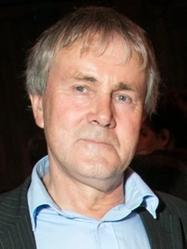 |
|
| Robert Holman | |
British dramatist Robert Holman, the "playwright's playwright who was revered for his finely crafted, hugely insightful and humane dramas," died December 3, the Guardian reported. He was 69. His death was announced by the agency Casarotto Ramsay & Associates, who called him "an extraordinary playwright and an extraordinary human being".
Among those paying tribute on social media was David Greig, who celebrated Holman for his "quiet, finely wrought work" exploring "the human ache for connection." Greig wrote that Holman was "overlooked in his time" but was "a much-loved influence and mentor. His integrity and poetry set a fine example. He will be missed." Holman's publisher, Nick Hern Books, praised his "beautiful, masterful plays, which influenced a whole generation of writers."
Holman's theater career spanned 50 years and more than 20 plays, beginning with German Skerries (1977), which won the George Devine award for most promising playwright. The Guardian noted that the play "had an admired revival at the Orange Tree theatre in Richmond in 2016, shortly after the closure of the Redcar steelworks on Teesside, which provides its backdrop."
Paul Miller, the Orange Tree's artistic director, said Holman embodied George Eliot's ideal of a "keen vision and feeling of all ordinary human life" and was "a very English artist: the plays are rooted in real life yet suggest other worlds and realities." Playwright Caitlin Magnall-Kearns called Holman "a master of the understated and unsaid."
His other plays include Making Noise Quietly, A Breakfast of Eels, The Lodger, Holes in the Skin, Jonah and Otto and A Thousand Stars Explode in the Sky. Holman also wrote for TV and radio and was a resident dramatist at the National Theatre and with the Royal Shakespeare Company.
"All my plays are a mixture of memory and imagination," he wrote, "and they have mostly used landscapes that I know well. I was born and brought up on a farm on the moors in North Yorkshire. Middlesbrough and the Tees Estuary, with the chemical and steel industry close by, were 20 miles away."

